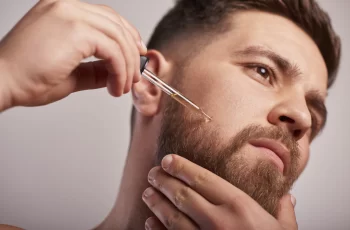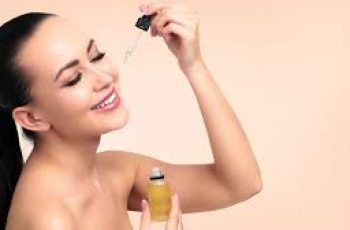Should You Add Blue Light Skincare to Your Anti-Aging Routine?
Blue light skincare products may be the protection your skin needs for all that time spent in front of a screen. Experts explain why.
In today’s world, many of us spend hours tethered to a screen of one type or another—whether it’s a phone, tablet, or a laptop computer.
All of that screen time however, may be impacting your skin thanks to the blue light—or short-wavelength light—that’s emitted, which research has shown can cause everything from premature aging to dark, long-lasting hyperpigmentation.
While it’s unlikely that any of us are about to abandon our phones and computers, there’s a growing variety of skincare products that have been designed to block harmful blue light rays and also address some of their impacts. But are these products all hype? Do they actually help? And if so, what exactly do they do? Here’s a closer look.
What Is Blue Light and Why Is It Harmful?
For those who may not be familiar with the term—blue light is a color on the visible light spectrum that’s emitted by computer screens, TVs, phones, and even as part of regular sunlight, board-certified dermatologist J. Rodney, MD, founding director of Eternal Dermatology Aesthetics and professor of dermatology at Howard University and George Washington University, told Health.
“It’s literally everywhere,” Dr. Rodney said of blue light.
There was a great deal of initial concern in recent years about blue light’s impacts on eyesight and sleep cycles—which are worrisome issues in their own right. But now there’s a growing body of research that has linked higher levels of exposure to blue light—which is also known as high-energy visible light (HEV)—to skin changes including DNA damage and cell and tissue death. Those impacts can, it seems, speed up the aging process and contribute to things like fine lines, wrinkles, and skin discoloration, Dr. Rodney said.
One recent study pointed out that the consequences of modern life is that we are all not getting enough natural light during the day and are conversely being “overexposed” to high levels of artificial light. The study went on to say that our skin is bearing the brunt of that exposure in the form of high levels of “oxidative stress” and that the link between oxidative stress and aging is well documented.
“Recent studies show that exposure of human skin cells to light emitted from electronic devices, even for exposures as short as 1 hour, may cause reactive oxygen species (ROS) generation, apoptosis, and necrosis,” said the study.
Translation: all of that screen time is not doing you—or your skin any favors.
“Blue light…penetrates deeper into the skin than UV light and stimulates activity of pigment-producing cells,” Joshua Zeichner, MD, director of cosmetic and clinical research in dermatology at Mount Sinai Hospital in New York City. That can lead to hyperpigmentation of your skin, among other things, he said. It can also cause melasma, a skin condition that causes patches and spots.
Keep in mind, though, that not all blue light is bad.
“In dermatology, we use blue light for photodynamic therapy in the treatment of acne and [premature] skin cancers,” Cindy Wassef, MD, assistant professor at the Rutgers Robert Wood Johnson Medical School, told Health. “The concern is the more constant, frequent exposure to blue light.”
What Is Blue Light Skincare Exactly?
Blue light skincare takes many forms—from sprays, creams, and gels to sunscreens that can be used to block blue light and also rejuvenate your skin. There are also night creams that promise to reverse the fine lines and wrinkles brought about by blue light and digital defense serums that promise to block the light’s rays to prevent wrinkling in the first place.
Blue light sunscreens meanwhile, work to block UV rays along with the blue light itself, Dr. Zeichner said. The standard sunscreen you grab from your drugstore shelf doesn’t generally offer that double benefit.
“Regular sunscreen doesn’t cover blue light as ideally as the ones targeted to blue light,” Dr. Rodney said. “Blue light tends to get through these, both chemical and mineral sunscreens.”
But there is a caveat here— tinted sunscreens actually do protect against blue light.
“Tinted sunscreen with SPF 30 and higher can protect the skin from blue light as well as UVA and UVB,” New York-based dermatologist Gary Goldenberg, MD, told Health. It’s due to the iron oxide pigments in the tinted sunscreen, Dr. Zeichener explained, noting that “the latest generation of sunscreens now contain antioxidants with visible light protection.”
It’s important to note that the research into blue light’s impact on skin is ongoing, Dr. Wassef added. Nevertheless, dermatologists say blue light sunscreen seems to be worth the hype.
“It gives you a better end result,” Dr. Rodney said.
DQH Knowledge drop: In your 20s, your skin cell turnover decreases. (Cell turnover is a key component in keeping your skin youthful.) You know what else slows down? Your collagen production. Starting in your 20s, collagen decreases by about 1 percent per year. Should you want to prevent fine lines and wrinkles, start by eliminating behaviors that contribute to premature aging. “If it’s bad for you, it’s bad for your skin,” says dermatologist Michel Somenek.
“Cigarette smoking reduces blood flow to the skin and causes premature wrinkling and a dull skin texture. Making the repeated pursed motion to inhale can also cause smoker’s lines. Alcohol and recreational drugs are toxins for the skin that damage its cellular structure and DNA,” Somenek tells us. “The faster you eliminate vices while you are young, the better chance your skin and body have to recuperate.” Also, adopting an anti-aging routine in your 20s is key. After all, the best offense is a good defense. We spoke to Somenek and experts Joshua Ross and Audrey Kunin to find out more.
Keep reading for the best anti-aging products for your 20s, according to skincare professionals.
Sunscreen
“We all know that the sun is the number one cause of skin aging and starting the prevention in your 20s is very important,” Ross says. “The majority of your sun damage won’t start to appear until you’re in your 30s, so don’t wait until you see it surface or you’ll be behind the curve. Stay ahead of it with a good-quality zinc-based sunscreen worn daily.”
Farmacy Green Defense Daily Mineral Sunscreen
An invisible sunscreen with SPF 30, plus botanical extracts meant to protect skin with tons of antioxidants. Bonus: It’s clean and fine to use under makeup.
Bareminerals Complexion Rescue™ Tinted Moisturizer Broad Spectrum SPF 30
Although we recommend you use your SPF and moisturizer separately, we also understand moments when you don’t have time or energy for that extra step. For those times, this bareMinerals moisturizer is a great thing to have on hand.
Vitamin C Serum
“A great introduction to anti-aging is to start with a vitamin C serum in your morning skincare routine,” Ross says. “It’s a powerful antioxidant that will neutralize free radicals and brighten the skin.” He adds that it’s a great way to counteract the effects of the sun’s harmful rays, which, as previously mentioned, are among the biggest causes of premature aging.
Drunk Elephant C-Firma™ Vitamin C Day Serum
The Drunk Elephant C-Firma is a lightweight serum that promises to give skin a glow by combining the brightening powers of vitamin C with ferulic acid, l-ascorbic acid, and vitamin E. The included sodium hyaluronate is meant to replace hydration loss, so you shouldn’t have to deal with any irritation.
Sunday Riley C.E.O. Rapid Flash Brightening Serum
This potent serum is jam-packed with vitamin C (15 percent, to be exact), which means it’s a potential superstar at both brightening skin and dousing it in antioxidants.
Peptides
Using peptides on your skin has many benefits, says Somenek. “The skin barrier is what defends the body against pollution, UV rays, bacteria, and toxins. It can be damaged by several everyday factors. Using topical peptides aids in building a stronger barrier,” he says. “Peptides comprise elastic fibers, which are a type of protein. These fibers help to make skin appear taut and firm. Peptides can also help repair damaged skin, relieve inflammation, and even out skin tone. Some peptides can kill acne-causing bacteria that is common in 20-somethings.”
Kunin agrees, saying, “Peptides are an excellent entry point for supporting collagen.” She recommends looking for face and eye treatments that contain these collagen-boosting powerhouses.
Charlotte Tilbury Magic Eye Rescue Cream
This Charlotte Tilbury super-emollient eye cream has a base of coconut oil and shea butter (read: it’s incredibly hydrating). Botanicals plus peptides are meant to help reduce dark circles and boost collagen, respectively.
This creamy moisturizer serves up potent collagen-boosting peptides and pycnogenol, and antioxidant-rich vitamin C. “Instead of sitting on top of the skin, peptides penetrate the outer layer so they go deep. The ‘signals’ they send tell the cells to produce elastin and collagen, which are needed for youthful-looking skin,” explains Somenek.
At-Home Peel Pads
Remember that skin cell turnover fiasco we talked about earlier? One way to help support it is by exfoliating. “Exfoliation is important to help keep skin fresh and luminous,” Kunin says. She recommends using at-home peel pads as an easy and effective way to exfoliate.
“The goal in your 20s is to fight the slowing pace of cell turnover. It is wise to use products that gently exfoliate, yet still remove oil and other impurities. Products that have Alpha Hydroxy Acids (AHA) or Beta Hydroxy Acids (BHA) are a good choice.”
According to Somenek, you should only exfoliate two to three times a week. “People of all ages are guilty of over-exfoliating and that can be too much of a good thing,” he says.
Dermadoctor Kakadu C Intensive Vitamin C Peel Pad
A few swipes of this Derma Doctor powerful peel pad promise to leave your skin glowing and smooth, thanks to the seven (yes, seven) types of chemical exfoliants, including AHA and BHA. It also contains vitamin C via Kakadu plum extract for added brightening and antioxidant protection.
KEY INGREDIENTS Kakadu plum extract is sourced from the Kakadu plum, a fruit grown in northern Australia. It contains vitamin C, which restores the skin’s natural barrier, increases collagen production, and soothes irritation.
Dr. Dennis Gross Skincare Alpha Beta® Universal Daily Peel Pads
These are the gold standard of peel pads, with a cult following and over 900 five-star reviews on Sephora. They’re easy to use and contain a blend of anti-aging exfoliating acids.
Emollient Night Cream
“In your 20s, you need to start upping the hydration in your skincare routine. You may have been cautious of over-moisturizing because of acne in your teens, but as you enter your 20s, your skin transitions and becomes drier,” Ross says. “I recommend an emollient night cream added into your evening skincare regimen.”
“Twenty-somethings need to make sure that they are not using creams that will clog their pores and cause excess oil production,” says Somenek. Opt for non-comedogenic products.
Cerave Skin Renewing Night Cream
One great choice is the CeraVe Skin Renewing Night Cream, which is a non-comedogenic night cream that leaves skin soft and glowy. It combines the moisturizing powers of ceramides and hyaluronic acid.
RoC Retinol Correxion Max Hydration Creme
“The best night cream ingredients contain retinol, benzoyl peroxide, and/or salicylic acid or hyaluronic acid. The goal is to moisturize, yet remove excess oil,” says Somenek. This Roc Retinol Correxion cream fits the bill as it contains both hyaluronic acid and retinol so it promises to moisturize while also being non-comedogenic.



